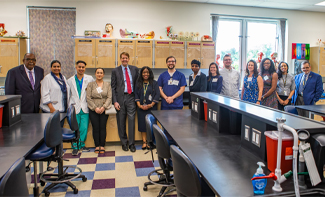At the end of May, officers from the U.S. Department of Education’s office of Federal Student Aid (FSA) visited NOVA’s Medical Education Campus for a conversation on skills-first training. Richard Cordray, FSA’s chief operating officer, and his team came to learn about how NOVA is creating an on-going pipeline to fill the region’s in-demand jobs, especially for critical healthcare workers. Cordray’s team included Marcia Boyd, director of partner technical assistance group and Joel Harrell, director of partner engagement and relationship management group who supported and coordinated this collaborative visit.

MEC Provost Dr. Shelly Powers hosted the tour at NOVA’s state-of-the-art medical campus. "At Northern Virginia Community College, the largest institution of higher education in Virginia, we have a very diverse population of about 75,000 students,” said Powers. “More importantly, NOVA’s Medical Education Campus is the only dedicated medical campus in the Virginia Community College System.”
The FSA team received an extensive tour and presentations about three of the MEC's in-demand programs--dental hygiene, medical laboratory technology and radiation oncology.
“Today, we want to recognize what we can do to help your students obtain specialized skills–to help them prepare for good jobs for sectors that are much in demand,” said Cordray. “These programs help students step immediately from the campus into the kinds of jobs that help build America’s future, as well as their own. The main purpose of our visit to campus today is to showcase the innovative programs that you are making available that propel students into the kinds of good-paying jobs that are essential for our country to thrive.”
Recently, the U.S. Department of Education earmarked $2.2 million to develop an LPN-to-RN transition program, which will allow the College to recruit and retain a diverse population of students.
Powers stressed NOVA's commitment to a diverse student body and to providing a steady stream of highly trained healthcare workers to fill a growing need in a growing region. She highlighted the MEC’s two divisions: nursing and health sciences. "The Medical Education Campus seeks to meet the current and projected demand of employers in the healthcare sector by increasing the number of nursing and health sciences professionals who are readily available to enter the workforce in the region."
Cordray and the DoE team learned about the MEC's programs and stackable credentials. Powers said, “We’re very proud of our certificate programs that allow students to go immediately into the workforce after one semester or one year, but also return and add to their credentials.”
Powers laid out the benefits of stackable certificate programs in health sciences, where students can stack or build on top of credentials they have already earned. For example, a student earns a certificate in phlebotomy and can immediately go into the workforce in that field. Since the phlebotomy certification is a steppingstone for a Medical Laboratory Assistant (MLA) certification, the student can return to earn the MLA certification and work in that field for several years. This means they are immediately in the workforce while earning additional credentials.
NOVA’s Medical Education Campus offers at least eleven degrees as well as a variety of certificates. The radiation oncology program is a distance-learning program in partnership with Virginia Western Community College.
The MEC serves approximately 3,500 students annually, and students in the nursing program are among the highest achievers in the region with impressive board pass rates. “Our nursing program board pass rate is 90%, and at least five of our health sciences programs have 100% board pass rates,” said Powers. “So, we're extremely proud of the outcomes that we achieve here at the Medical Education Campus.”
The FSA team had the opportunity to hear directly from current MEC students on how the program has impacted their lives. Dental Hygiene student Daniel Harwood told of his previous career, a very unsatisfying job at a bank. He became a little emotional when sharing his story and how he wants to become a dental hygienist to help people. Through NOVA’s program, he has already had the opportunity to help others and “it feels amazing,” he said. He shared that the program was only possible for him with the help of federal financial aid. He is excited and passionate about his new profession.
Powers said the MEC's dental hygiene program was recently awarded a $250,000 G3 innovation grant, which will provide new technology and more state-of-the-art equipment in a field that is constantly using ever-advancing technology. G3, a Virginia program, stands for ‘Get a skill. Get a job. Get ahead.’ NOVA has also benefitted from a $300,000 grant from Achieving the Dream to diversify nursing pathways. The College is committed to working to solve the region’s nursing crisis.
In addition, the MEC received approximately $25M in one-time, Virginia general assembly dollars toward the construction of an expansion of the campus, potentially enabling the college to significantly grow the number of nursing students admitted into the RN program (from 80 to approximately 300) to serve the region. Alongside the expansion, the funding will allow for enhancements to MEC's state-of-the-art facilities to include more high-tech and hands-on learning opportunities for students, expand current programs and implement new ones.
NOVA is excited to continue to work with private, state, local and federal partners to grow this incredible campus and its capabilities. The College thanks the DoE’s FSA unit for highlighting the campus’ contributions to the wider community.